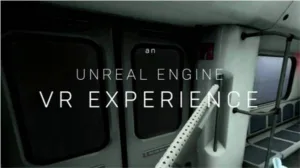IGN the online gaming portal and subsidiary of Ziff Davis reported on an interview with Epic Games Founder Tim Sweeney after the release of the VR experience Bullet Train. Epic has invested in the creation of a 5 minute VR teaser game Bullet Train to develop and demonstrate the ability of the Unreal gaming engine as a platform for virtual reality gaming.
Bullet Train was developed by a group of 12 developers in a ten week time span. Since this is not a full game, it will be interesting to see what it will take for a full game being developed for the virtual game platform.
Source: EPIC – Bullet Train VR Game
IGN also reports that Tim Sweeney is very bullish on the future of virtual reality gaming. He expects that there will be three to five million headsets being sold in 2016. He also predicts that the development of virtual reality hardware is just starting and he expects that the VR market will be “utter churn and chaos. And it’s gonna be awesome, with the quality of the hardware doubling every year, you’re gonna want a new headset every year if you’re a serious early adopter.”
Epic expects that their Unreal gaming engine 4 will be the basis of all VR games until this new technology reaches a larger audience of about 250 million users. Then they may change their gaming engine to Unreal Engine 5.
Analyst Comment
While the hardware quality does need a continuous improvement, a doubling of hardware quality per year seems more than overly optimistic. What we have seen so far from Oculus as the leader in the VR headset market is progressing at a much slower pace. Besides optical components we also need higher resolution imagers, something that is just not on the horizon at the moment. There is no market that would pay for such development.
There is still the pressure from projector makers for at least 4K / UHD resolution, but these imagers are not of a size that would make them suitable for virtual headsets, without even considering the required power demand for the imager as well as the other electronics. This is a significant hurdle that VR headset makers have to overcome before VR can increase its market reach.
As stated in the interview, once there are 250 million headsets sold, we can expect that every game developer will pay very close attention to this market. The question is how the gaming market will get to such numbers without good games and good hardware. We may have to wait a few years before the hardware capabilities attract enough game makers and gamers to jump into this market.
I am also a believer in the VR gaming potential, however I am a little more realistic when it comes to the time line. Three to five years seems to be a little optimistic to me. Five to ten years seems to be more realistic. (NH)

